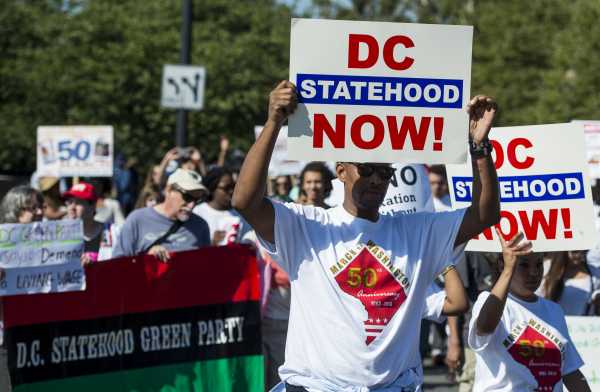
In DC and Puerto Rico, roughly 4 million American citizens are denied representation in Congress. By any normal application of democratic principles, this is an outrage. But Democrats are oddly complacent about it, in part because fixing it might help them politically, and they’re worried that might seem unfair.
This is a problem.
Rhode Island Democrat Sheldon Whitehouse is one of the Senate’s most thoughtful members on issues of government reform. He’s co-written a book about money in politics, and been out front on gerrymandering. So it’s worth noting the strangeness of his answers here.
In an interview with the Providence Journal’s editorial board, Whitehouse was asked about the push for DC and Puerto Rico statehood. “I don’t have a particular interest in that issue,” he said of DC statehood. “If we got one one-hundredth in Rhode Island of what D.C. gets in federal jobs and activity, I’d be thrilled.”
“Puerto Rico is actually a better case because they have a big population that qualifies as U.S. and they are not, as D.C. is, an enclave designed to support the federal government,” he continued. “The problem of Puerto Rico is it does throw off the balance so you get concerns like, who do [Republicans] find, where they can get an offsetting addition to the states?”
Related
The rigging of American politics
These are genuinely bizarre answers. Whitehouse dismissed the case of DC on the irrelevant grounds that it receives spillover spending and employment from the federal government (much of which goes to workers commuting in from Virginia and Maryland, who are represented in Congress), and he waved off Puerto Rico on the grounds that if it became a state, it would likely elect Democrats, and that would throw off “the balance,” which wouldn’t be fair to Republicans, so it’s never going to happen.
In an emailed statement, Whitehouse tersely clarified his remarks. “I would support statehood for Washington DC and Puerto Rico if either of those proposals came up for a vote in the Senate,” he said.
In Whitehouse’s answer, you hear a pragmatic politician waving off questions he considers distractions from policymaking. Rather than talking about statehood bills Democrats don’t have the power to pass, they should focus on health care and climate change bills (which they also don’t have the power to pass).
But policymaking is downstream from the political system that apportions that power, and that political system is increasingly broken. If Democrats are going to fix the policymaking process, they’re going to need a framework, both philosophical and political, for fixing the political system that governs it.
That framework, luckily, is close at hand. It’s embedded in their name. It’s democracy.
The undemocratic, and un-Democratic, structure of American politics
Consider the context in which Whitehouse is speaking. Since 2000, fully 40 percent of presidential elections have been won by a Republican who lost the popular vote. The Senate’s bias toward states rather than populations gives Republicans a persistent advantage in the chamber; FiveThirtyEight’s Nate Silver calculates that the average state is 6 percentage points more Republican than the nation as a whole. As for the House, Democrats need to beat Republicans by as much as 7 or 8 points in the popular vote to hold a majority.
Republicans are making the most of their structural advantage. Brett Kavanaugh now serves on a Supreme Court where four of the nine justices were nominated by a president who lost the popular vote in his initial run for office, and where the 5-4 conservative majority owes its existence to Senate Majority Leader Mitch McConnell’s extraordinary decision to deny Merrick Garland a hearing.
This Court will rule on the constitutionality of gerrymandering, voter ID laws, union dues, campaign finance, Obamacare, and more. That is to say, they will rule on cases that will shape who holds, and who can effectively wield, political power in the future. And there is every reason to believe they will continue buttressing Republican power in those rulings.
That Republicans do not seem particularly concerned that their process reforms might disadvantage Democrats is beyond dispute. Look at North Carolina, where Republican legislators are trying to change the state Constitution to gain power over both elections and courts. Look at Wisconsin, where state Republicans gerrymandered the seats to make Democratic control a near impossibility.
Look at Citizens United, which research finds gave Republicans a 5 percentage point boost in elections for state legislators. Look at Georgia, where the GOP candidate for governor currently serves as secretary of state and is executing a voter purge designed to help him win office.
As I’ve reported elsewhere, as the left realizes it’s playing a rigged game, it’s becoming determined to rewrite those rules itself. There’s talk of court-packing, of impeaching judges, of cutting California into pieces to increase Democratic representation in the Senate. This is part of Michael Avenatti’s appeal: If the GOP is going to treat this as a street fight, perhaps Democrats need a street fighter.
A cycle of escalation here could consume American politics. After all, if the left is successful in any of these changes, the right will see those rewritten rules as norm-defying power grabs that need to be reversed, matched, or exceeded.
Democrats for democracy
America is in an unstable equilibrium. Its current political system is producing outcomes that feel illegitimate to the left. Any effort to reform that system would produce outcomes that feel illegitimate to the right. We cannot stay here, but we cannot move.
What’s needed is some principle beyond the short-term composition of Congress that can act as a guiding star, that can help Democrats both choose process reforms to prioritize and explain them to the public.
Democrats have one close at hand: democracy. The Democratic Party can be, and should be, the party of democracy. It should be the party that wants more people to participate in the political process and wants to make sure more people can participate in the political process.
Under that rubric, representation for DC and Puerto Rico are no-brainers; so too is a voting holiday, automatic voter registration, enough voting machinery that long voting lines are a thing of the past, and much more. (The Brennan Center has a number of good proposals along these lines.) If Republicans believe that more democracy is bad because it would disadvantage them at the polls, force them to argue that point explicitly.
But for a democracy agenda to succeed, Democrats themselves will have to believe in it and communicate its importance. That means that when a question like Puerto Rico statehood comes up, they speak to the core principles that it evokes, not the political friction it might cause with Republicans.
If Democrats like Whitehouse treat efforts to expand the franchise as a distraction or a power grab, so too will everyone else. But giving American citizens representation in Congress isn’t a power grab. It’s the essence of democracy.
Sourse: vox.com






